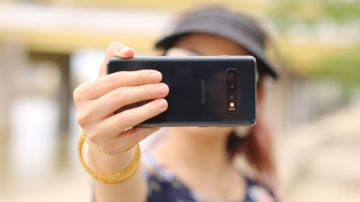Has Photo Filtering Created Widespread Body Dysmorphia?
Recently, I stumbled upon one of the most fascinating images I’d seen on social media in a long time

Photo: Unsplash/@styleanthropy
Recently, I stumbled upon one of the most fascinating images I’d seen on social media in a long time. To be fair, “stumbled upon” is a stretch. I’d been following @celebface on Instagram for some time now, as it offers me secret relief in a world where I feel like women are constantly lied to. “I was born this way,” has become the anthem of beautiful girls everywhere leaving many feeling confused and dismayed as to how the perfect nose and high cheekbone genes passed them over. For women of color, seeing full lips on girls of all ethnicities who claim they got lucky in the natural selection process can be frustrating. And if you’re a woman of color who doesn’t have what people claim are ubiquitous among black and brown girls (lips! lips! lips!), it’s downright maddening.
The whole world of social media can feel like nonstop propaganda convincing women that there is not only one acceptable body shape, but also that there is one type of face that is most appealing.
So when I came across this image, I strangely felt vindicated.
The image set out to prove one thing — beauty has become more standardized than ever. People are literally beginning to look like clones of one another, “sister faces” if you will.
After my own relief that I am not one of the “sister faces” passed, I realized that perhaps, as host of Naked Beauty podcast Brooke Devard suggested on a recent podcast, we are entering an era where natural beauty — meaning, the face that you’re born with — will become completely passe. No one simply rocks their real face anymore; filtering, filler-ing, and completely reimagining your face is the trend.
But, at what cost? According to reports, this new trend is not only dangerously irreversible, but it also can create a type of beauty dysmorphia. A WebMD article on “Snapchat Dysmorphia” cited a Boston University School of Medicine’s dermatology department report saying people have begun requesting “fuller lips, bigger eyes, or a thinner nose” from plastic surgeons, based on what they have gotten accustomed to seeing themselves look like with filters. Essentially, after spending so much time envisioning one’s self through the lens of a Snapchat pretty filter or a FaceTuned-to-perfection image, some girls have committed to permanently implementing the change — never to go back to their original face.
While there have been movements to stop the shaming of people who have had plastic surgery to alter their image, there are also considerable drawbacks that come when women lean into the idea that they need to look permanently filtered. Your future husband may or may not try to sue you if he only finds out about your natural, unfiltered face once you give birth to your children, but in a more likely scenario, achieving an engineered version of perfection may be downright dangerous for your health and overall wellbeing. One episode of Botched or a simple Google search reveals stories of people who’ve had tissue death or even blindness as a result of their surgeries and fillers.
Fortunately for many, doctors have become trained to look out for women who are expressing interest in receiving plastic surgery to look more like a photoshopped or filtered version of themselves. Ultimately, it is an indicator of body dysmorphia. A report in the National Library of Medicine found that one doctor has begun referring patients who make these requests to counseling, suggesting that other doctors “look out for any red flags from patients who might have any underlying signs of body dysmorphia.”
While it may feel extreme, if you find yourself or someone you love suggesting they would like to get plastic surgery to reflect photoshopped images or showing signs of difficulty accepting how they look without these additives, seek professional help to ensure this isn’t a form of growing dysmorphia. Even if much of society is cosigning this behavior, that does not make it necessarily safe or healthy.

















